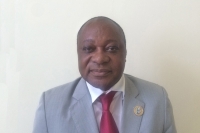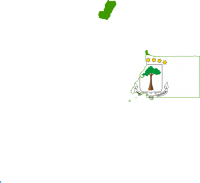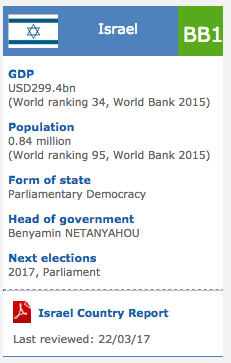Equatorial guinea: Malabo City
2012/12/19
.png)
Malabo is the capital of Equatorial Guinea, located on the northern coast of Bioko Island (formerly Fernando Pó) on the rim of a sunken volcano.With a fast growing population of 155,963 (2005) it is also the second largest city in the country, after Bata in Río Muni on the African mainland.
Climate
Despite its location near the equator, Malabo features a tropical wet and dry climate. Malabo sees on average 1,800 mm of rain per year. The city has a pronounced, albeit short dry season from December through February. January is normally driest with just 5 mm (0.2 in) of rain falling on average. It as well has a very lengthy wet season that covers the remaining nine months. On average, the months hit hardest by the wet season are from September to October, with 500 millimetres (20 in) of rain falling between them.
Daytime temperatures do not vary at amount day to day, and only vary a few degrees throughout the entire year. At night, the average low temperature is 21-22 degrees in each month of the year, apart from January when average low is 19 degrees). January has cooler nights and hotter days because it has clearer weather. Nonetheless, Malabo, with only 1,180 hours of sunshine per year, is of the gloomiest capitals in the world and experiences much fog even when it is not raining.
Discovery of oil
Malabo has been significantly affected by Teodoro Obiang Nguema Mbasogo's growing co-operation with the oil industry. The country's production has reached 360,000 barrels per day (57,000 m3/d) as of 2004, an increase which led to a doubling of the city's people, but for the vast majority, very little of that wealth has been invested in development.
- Related Articles

Africa's Relationship With China Is Ancient History
2017/07/02 In 2002 South Africa's Parliament unveiled a digital reproduction of a map - of China, the Middle East and Africa - that some speculated could be the initial map of the African continent. The Da Ming Hun Yi Tu - the Comprehensive Map of the Great Ming Empire - was drawn up around 1389 during the Ming Dynasty, according to historian Hyunhee Park.
Africa: Making Things Happen at the Bank - 'Not a Talk Shop' - Akin Adesina
2017/07/02 Dr. Akinwumi Adesina is focusing on five areas to achieve the African and world goals for a prosperous continent since becoming president of the African Development Bank - Africa's major public financial institution in September 2015. He was a keynote speaker at this month's Corporate Council on Africa's U.S.- Africa Business Summit in Washington D.C. and moderated a lively panel with five African government ministers. He as well received the Gene White Lifetime Succcess Award from the World Child Nutrition Foundation. This week, he was named the 2017 recipient of the World Food Prize, a prestigious honor that includes a $250,000 award. In an interview in Washington, DC, Adesina discussed the Development Bank's ambitious schedule and his vision for attracting the increase capital Africa needs. Posting questions for AllAfrica was Noluthando Crockett-Ntonga.
Climate change laws around the world
2017/05/14 There has been a 20-fold increase in the number of global climate change laws since 1997, according to the most comprehensive database of relevant policy and legislation. The database, produced by the Grantham Research Institute on Climate Change and the Environment and the Sabin Center on Climate Change Law, includes more than 1,200 relevant policies across 164 countries, which account for 95% of global greenhouse gas emissions.
Martin Crisantos Ebe Mba, Chairman of the National Bank of Equatorial Guinea
2016/12/10 Senator and Chairman of the National Bank of Equatorial Guinea Martin Crisantos Ebe Mba looks at the political, economic, and social changes taking shape in the country in recent years making it “a valued country, admired for its evolution and development at all levels” and its positioning as a financial platform for Central Africa and beyond.
Steady evolution was made in the cooperation between the two nations in various fields
2015/10/02 The friendly relationship and cooperation between the People's Republic of China and the Republic of Equatorial Guinea sustained sound development in 2013. The two nations enjoyed close political exchanges and increasing mutual trust. In September, Zhao Hongzhu, member of the Secretariat of the CPC Central Committee and Deputy Secretary of the CPC Central Commission for Discipline Inspection, led a CPC delegation to Equatorial Guinea.
- Equatorial guinea News
-
- BOTSWANA: Africa: USA-Africa - No Policy? Bad Policy? or Both?
- BOTSWANA: Africa: U.S. State Department To Get Experienced Diplomat in Key Africa Post
- BOTSWANA: Africa’s economic growth in 2016 was driven by East Africa
- BOTSWANA: Africa property offers rich pickings for the brave
- BOTSWANA: Bill Gates sees US likely to maintain aid levels for Africa
- BOTSWANA: Africa: Graca Challenges Women, Girls to Grab Emerging Opportunities
- Trending Articles
-
- BOTSWANA: Africa: USA-Africa - No Policy? Bad Policy? or Both?
- NIGERIA: Nigeria: Diezani Forfeits N7.6 Billion to Govt
- BOTSWANA: Africa: U.S. State Department To Get Experienced Diplomat in Key Africa Post
- EGYPT: Egypt foreign reserves at highest since 2011 uprising
- GHANA: Falling cocoa prices prompt joint action from Côte d’Ivoire and Ghana
- QATAR: Qatar closes Chad embassy in Doha




.gif?1356023993)





